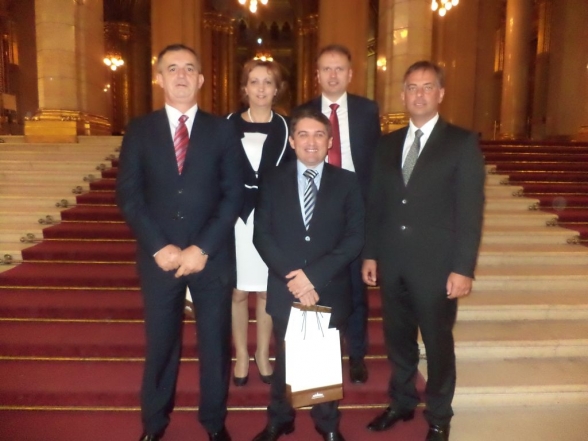Within the official meetings, attended by H.E. Ambassador of Montenegro in Hungary Mr Mirsad Bibović, the Delegation, in the Parliament of Hungary, held meetings with the members of the Committee on Education, Science and Research, headed by the deputy chairperson of the Committee Mr László Pósán; Chairperson of the Committee on Culture and Media Mr László Simon, as well as the President of the Hungary-Montenegrin friendly section of the Hungarian Parliament – Mr Arpad Janos Potapi. Additionally, the Delegations also met with the Head of Department to the Ministry of Human Resources, Mr Kološ Galfi. The Delegation also visited the exclusive Sport Centre MOM SPORT in Budapest.
During the meeting with the members of the Committee on Education, Science and Research of the Hungarian Parliament, it was pointed out that the signing of an agreement between the two line ministries was expected soon, within which, among other things, the student exchange between two states was envisaged. With regard to investing in education, Hungary allocates 10% of its budget to the field of education, while significant additional funds are provided from various other sources. Hungary education system is currently undergoing an overhaul of the Bologna education system which over the years of implementation had not shown to be successful, and it would determine whether the Bologna system should be implemented at all levels of education.
Chairperson of the Committee on Culture and Media of the Hungarian Parliament Mr László Simon informed the members of the Delegation with the competencies and work of this Committee, as well as the structure of parliamentary committees in general. Unlike the Montenegrin Parliament, culture, education, science and sports in the Parliament of Hungary are divided into three committees. With regard to the mobile and immobile cultural heritage, members of the Delegation were informed that the Hungary had an all-encompassing cultural heritage protection system which had been institutionally around for one hundred years. With regard to the funding of culture, Hungary had invested around 800 million euro in culture, out of which 400 million had been invested by the Government, and 400 million by the municipalities. Among other things, it was pointed out at the meeting that Hungary was also allocating over 130 million euro for theatre from the budget per year.
During the meeting in the Ministry of Human Resources, Mr Kološ Galfi stated that the Government of Hungary had drastically reduced the number of ministries lately, and they had formed the so-called mega-ministries and that the Ministry of Human Resources was one of them. Several fields, such as: education, science, culture, sports, health, social affairs, and labour fall under the competence of this Ministry. It was pointed out that the education reform was underway in Hungary, and that in the following period the state would try to reduce the number of students and increase the quality of education.
Head of Delegation, MP Saša Pešić informed his interlocutors on the manner of operations of the Committee on Education, Science, Culture and Sports of Montenegro, the structure of parliamentary committees, education and culture system, as well as the European integration process in which the state of Montenegro was currently at. Head of Delegation also extended an invitation to his colleagues from the Hungarian Parliament to return the visit to the Parliament of Montenegro.
During the conversation in the Hungarian Parliament, members of the Delegation expressed special interest in the experiences of Hungary regarding issuing of teacher licencing and re-licencing, budget allocation for the field of education, science and culture, and the manner of election of principals of educational institutions, material position of teachers, cultural heritage protection system etc.
Study visit to the National Parliament of Hungary was assessed as very successful, with a mutual mood that the cooperation of the two parliaments should continue, and it was also pointed out that the exchange of experiences and constructive conversations, as well as established contacts, would be of special significance in the future work of the Committee on Education, Science, Culture and Sport.









